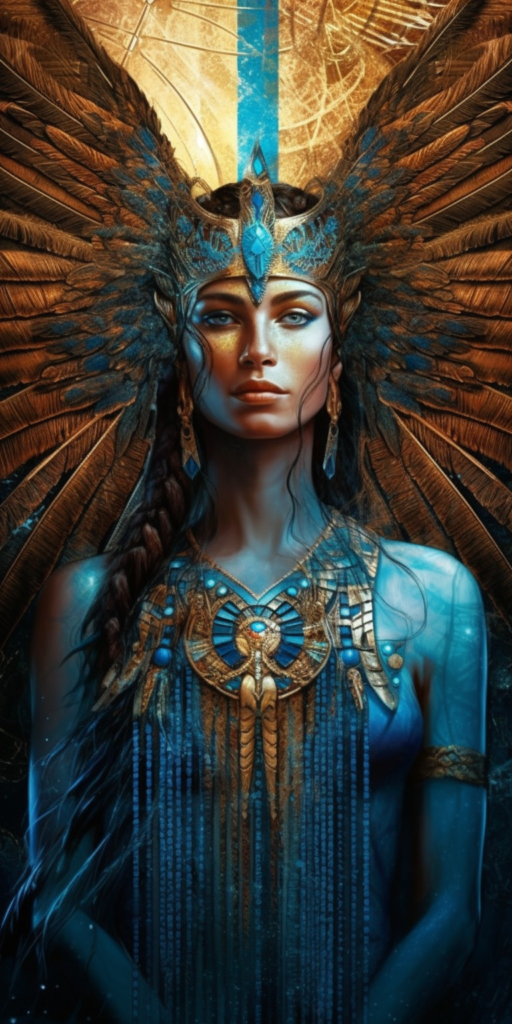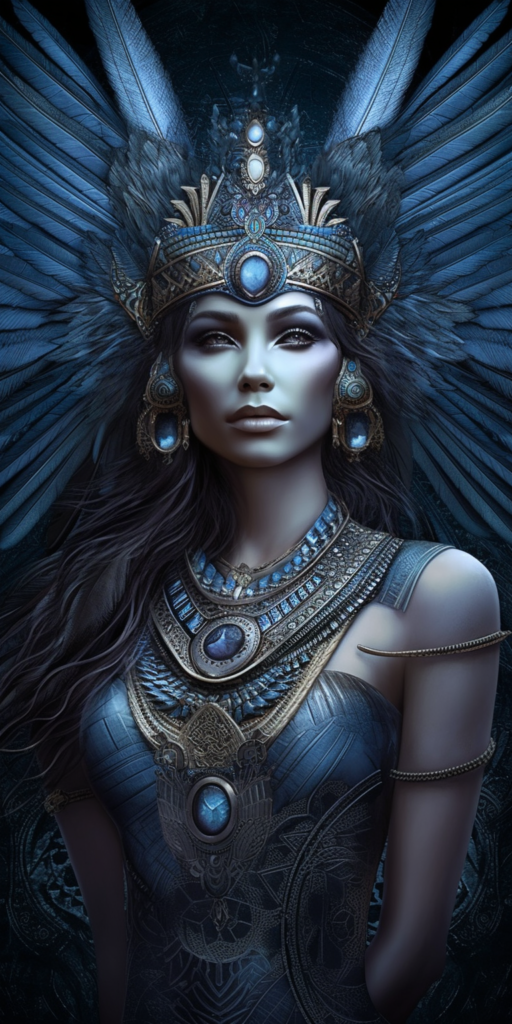Ma’at, Goddess of Truth, Justice, Balance, and Order
Ma’at is the ancient Egyptian goddess of truth, justice, balance, and order.

- Pantheon: Egyptian pantheon
- Deity Title: Goddess of Truth, Justice, Balance, and Order
- Deity Symbol: An ostrich feather, representing truth and balance
- Home Plane: The realm of the gods
- Deity Level: Greater deity
- Alignment: Lawful neutral
- Aliases: Maat, Ma’at
- Superior: None
- Traditional Allies: Thoth, Ptah, Anubis
- Traditional Foes: Seth, Apep, Ammit
- Divine Artifact: The Feather of Ma’at, which is used to weigh the hearts of the dead in the afterlife.
- Servants: The Shai, spirits of fate and destiny.
- Servitor Creatures: None
- Sacred Animal: The ostrich, representing truth and balance.
- Manifestations: The sound of an ostrich feather brushing against the ground, the scales of justice, the sun disk with outstretched wings.
- Signs of Favor: The scales of justice tipping in one’s favor, favorable winds and weather, a feeling of balance and harmony.
- Worshipers: Judges, lawyers, priests, pharaohs, those seeking justice and balance in their lives.
- Cleric Alignments: Lawful good, lawful neutral, lawful evil
- Specialty Priests: Justices, who serve as judges and arbiters of disputes.
- Holy Days: The Festival of Ma’at, held annually in early August.
- Portfolio: Truth, justice, balance, order, harmony, the afterlife.
- Domains: Law, Nobility, Protection, Repose, Truth.
- Favored Weapon: None
- Favored Class: Cleric
- Favored Race: Humans
- Duties of the Priesthood: Upholding the principles of truth and justice, serving as judges and arbiters of disputes, maintaining balance and order in the universe.
- Major Cult/Temple Sites: The Temple of Ma’at in Thebes, the Temple of Ma’at in Memphis.
- Benefits: Clerics of Ma’at are granted the ability to cast spells that protect and uphold the principles of truth and justice, as well as the ability to use the Feather of Ma’at to divine the truth in matters of dispute. They are also granted the ability to call upon the power of the scales of justice to smite their enemies.
Ma’at is the ancient Egyptian goddess of truth, justice, balance, and order. She is often depicted as a regal woman wearing a feather on her head, symbolizing the weight of truth and justice. Her appearance is ethereal, with long wings on her arms that spread out behind her, signifying her ability to fly to any place where her presence is required. Her complexion is flawless, with soft and serene facial features that radiate inner peace.
Ma’at’s role as a deity was to maintain order and balance in the universe. According to ancient Egyptian mythology, during the creation of the world, she appeared before the gods and gave them the law and order that governed their actions. She was seen as the ultimate judge of the universe and was responsible for ensuring that the gods, as well as the mortal world, adhered to the principles of truth, justice, and harmony.
Ma’at’s actions were guided by the concept of “Ma’at” itself, which represents the principles of truth, justice, and balance. Her goal was to ensure that these principles were upheld by both the gods and the people of Egypt. She was believed to weigh the hearts of the deceased against the feather of truth during the judgment of the dead, determining whether they were worthy of entering the afterlife.
In ancient Egyptian art, Ma’at was often depicted holding a scale in one hand and a feather in the other, symbolizing her role as the arbiter of truth and justice. She was also shown with a scepter, representing her authority over the gods and the mortal world.
Overall, Ma’at was a revered figure in ancient Egyptian mythology, embodying the principles of truth, justice, and balance. Her image and teachings continue to inspire people to seek harmony and balance in their own lives and strive for a just and equitable society.
Divine Artifact

Feather of Ma’at Wondrous item, artifact (requires attunement)
This feather, plucked from the scales of the goddess of truth, justice and order, is used to weigh the hearts of the dead in the afterlife.
While attuned to this feather, you gain the following benefits:
- You have advantage on all Charisma (Persuasion) checks made to persuade others to tell the truth.
- You can cast the zone of truth spell (save DC 18) once per day, without requiring any material components.
- You can cast the speak with dead spell once per week, without requiring any material components.
- When you die, the Feather of Ma’at will be placed on your heart, and you will be judged according to the weight of your heart against the feather. If your heart is lighter than the feather, you will be granted entrance into the afterlife; if it is heavier, you will be devoured by the demon Ammit.
Once per year, you may use the Feather of Ma’at to weigh the heart of a creature that has died within the last 24 hours. The creature must be within 5 feet of you, and must not have been the victim of any spells or effects that would alter the weight of its heart. The creature’s heart is considered to weigh exactly the same as the Feather of Ma’at, unless it is found to be heavier, in which case the creature is judged as unworthy of entrance into the afterlife.
If the Feather of Ma’at is destroyed, it will reappear in the scales of Ma’at in the afterlife, where it will continue to serve its purpose.
Currently in the World

Ma’at, the goddess of truth, justice, balance, and order, has been a guiding force in the universe since the beginning of time. From the creation of the world to the present day, her influence has been felt by gods and mortals alike.
In the ancient world, Ma’at was a revered figure, worshipped by the people of Egypt as the arbiter of truth and justice. Her teachings were passed down through the generations, guiding the actions of kings and priests, as well as everyday people. She was believed to hold the key to eternal life, and her followers sought to live their lives in accordance with her principles.
As time passed, Ma’at’s influence spread beyond the borders of Egypt, and she became known as a universal deity, embodying the ideals of justice and fairness. In the 1450s, Ma’at’s presence is felt strongly in the world, as conflicts rage and people struggle to find balance in a changing world.
Despite her immense power, Ma’at is not without weaknesses. She is often seen as rigid and inflexible, insisting on adherence to the principles of truth and justice even in situations where compromise may be necessary. Her relationships with other gods are complex, with some seeing her as a valuable ally and others as a threat to their power.
Ma’at’s goals and desires are rooted in her desire for balance and harmony in the universe. She seeks to uphold the principles of truth and justice

 Buy me a coffee
Buy me a coffee